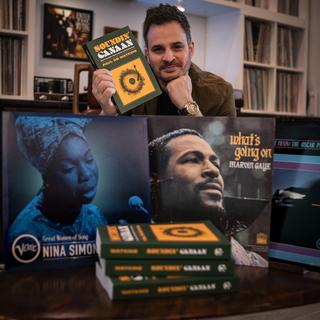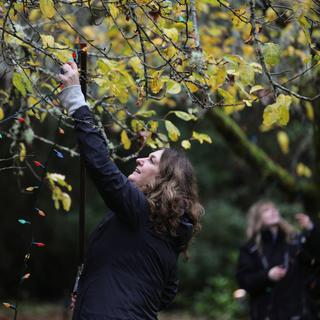Dr. Michael Quinn, VIU’s Provost and Vice-President, Academic.
Dr. Michael Quinn, VIU’s Provost and Vice-President, Academic is completing his first year so we asked him to share his thoughts, learnings and insights at this important time for VIU.
What were your first impressions of VIU?
I can’t believe how fast a year has gone by! What really impresses me about VIU is the people. The team I work with on a daily basis is outstanding. It was important to me that if I was going to make a substantial move at this point in my career, it was going to be the people and the place. I feel like I struck gold that way. People have been incredibly welcoming, collegial, astonishingly hard-working and committed to this place and the idea of it.
The other thing for me is just that the physical environment is outstanding. I look out my window from my office desk and across the water to the mountains, it takes your breath away. And I get to play air traffic controller for the group of hummingbirds outside my window here constantly. Sometimes there are six of them at a time. I ride my bike to work almost every day. I think I have only missed four or five days since I started last July. I cycle through the forest and see greenery all year. I have wildlife encounters regularly. I pinch myself that I get to call this place home.
What was the focus in the first year?
I wanted to really try to understand what’s going on and what has gone on historically. It’s been about learning the history and the systems. I’ve joked that I have had to learn to speak the VIU acronyms. That isn’t entirely tongue and cheek because if you understand those acronyms, you understand the committees, the governance processes, and the structures as well as how things work.
What are you planning on focusing on into the second year?
Moving into year two, the focus is on examining how those systems have to change - and they do have to change because of the current budget situation. I don’t want to be making decisions or setting directions or having discussions that are purely driven by financial numbers, but the bottom line is also the bottom line and it actually provides a great vehicle for helping to direct positive change. We’re steering how we can capitalize on the potential of what has been built here over the years and what we can do successfully into the future on those foundations.
An example of this is work VIU has done with our Indigenous community partners. This year we were gifted a new name for our campus in the qathet region, “tiwšɛmawtxw”. We are continuing our collaboration with the Tla’amin First Nation on creating a world-class model for how post-secondary institutions can work with Indigenous communities on academic credentials to help learners stay and work in their communities. VIU has established itself as a leader in this space and we want to support our Indigenous partners in developing a conversation – and relational, land-based learning. This is the history of this place and the reason it is so impressive. The environmental quality is high because Indigenous people have been living with landscape for 10,000 plus years. The nations are interested in working with us to make sure that youth have opportunities right in their communities. It is a very important part of Truth Reconciliation – accessing culturally relevant education as part of self-determination. I think VIU has an opportunity to build a world-class model that we can make accessible.
The other major focus I would put in the category of housekeeping. The analogy I like to use is when a young couple buys their first house and over time they build an addition and develop the basement and stuff accumulates. Over time, they fill all those spaces with stuff and at some point, they stop and look around and the house is not the house you have built but it’s what you ended up with because you kept adding pieces here and there to it. Institutionally, I think this is where VIU is at. We need to step back, take a look around at all the added parts and figure out how to make it function a fully integrated house again. For the part of my office, this focus is on academic programming.
Can you please explain a bit more about plans for academic programming?
Any changes are going be based on real evidence. This means examining our program mix in a quantitative way so we can make evidence-based decisions. I also want to stress that we know numbers do not capture everything, there are subjective valuable components we need to continue to do. That is part of post-secondary education. That’s the beauty of the university – it is a collection of things, some of which make money and some of which cost money and a whole bunch of stuff in between that provide an experience of intrinsic value to our students and society as a whole. It does need to break even. My job over the year is to work, through the Deans, to the faculties and departments on helping make those decisions so we’re able to turn the tide, financially and in a way that is pedagogically sound.
What are some of the ways VIU is unique as a post-secondary institution?
I would say the University’s community relationships are part of what make it unique. This is very much a place-based institution. Much of our research is applied and closely connected to meeting community needs and much of our academic programming is designed to address the most pressing issues of our times. This extends to the position of VIU within Nanaimo, we are a key player in the community, and that is not always the case for post-secondaries. It shows our potential and decisions should be built around that uniqueness. I think there are many opportunities that would make our regional economies strong, sustainably. Some areas are fisheries, forestry, Indigenous community-based conversation and tourism,agriculture and food security are areas for highest growth potential. In the Cowichan Valley, there is a strong market for wine and spirit production as well as hospitality. This comes back to place. As a person who is new to the area, the magic of the island is hard to understate. When you live somewhere for a while, it’s natural to take things a bit for granted. This place is globally significant.
What is your favourite part of the job?
I think it’s the ability to affect positive change. I feel like I’ve arrived here at a time when the institution is really moving positively forward. Organizations move in pulses and probably the last big pulse here was becoming a university. Now we know how to be a university – we’ve achieved that. So, now we look at what we learned from the last 15 years and what do we want to be in five or 10 years? The Strategic Plan established by President (and Vice-Chancellor) Saucier is a strong articulation of the next leg of this journey and it’s exciting for me to arrive here now and do the work of implementing the strategic plan and the academic plan. Across the country, the job of being a senior academic leader is similar, but what makes it unique and special is the people. The team that is assembled here is a joy to work with and we have some hard to do. VIU is tackling big challenges, but I think, because of the people, we are up for the challenge.




